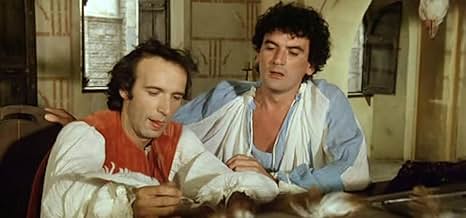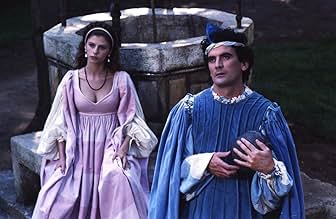Saverio e Mario, due amici per la pelle, si trovano con l'auto presso un passaggio a livello in aperta campagna. Data l'enorme attesa del treno, decidono di prendere una scorciatoia che li p... Leggi tuttoSaverio e Mario, due amici per la pelle, si trovano con l'auto presso un passaggio a livello in aperta campagna. Data l'enorme attesa del treno, decidono di prendere una scorciatoia che li porterà a smarrirsi , trovandosi così nel 1492....Saverio e Mario, due amici per la pelle, si trovano con l'auto presso un passaggio a livello in aperta campagna. Data l'enorme attesa del treno, decidono di prendere una scorciatoia che li porterà a smarrirsi , trovandosi così nel 1492....
- Regia
- Sceneggiatura
- Star
- Premi
- 1 candidatura in totale
Recensioni in evidenza
Until they reached the pinnacle of their careers, they went through a series of films where, assuming the role of comedians, they made funny comedies, but of limited content. It's a bit the fate of comedians, to make the public laugh until they finally get autonomy and courage to make a serious comedy, where the laughter is poetic and the wit is intelligent. These two ended up making it and getting the right recognition, which doesn't always happen.
In this four-hand project, the script is weak and even the comedy, with some amusing moments, relies more on the improvisation capacity of the two actors than on situations or previously written dialogues. Above all, it is worth by the natural grace of these two clowns, of unique quality, who are always a pleasure to see perform.
The plot is very simple: Mario and Saverio, a teacher and a janitor in an elementary school, find them in the year 1492 and it is the origin of all the funny situations you'll find in the movie.
The language used by Mario and Saverio is Italian, but Mario uses a typical Naples accent and Saverio it's using his Tuscan influence, so the language they use is crucial to the final meaning of the movie.
In the original version there was an additional scene, that the directors had to cut off when publishing the movie, despite this the movie is still very funny, and is its freshness, its lack of bad words what makes it a good comedy and a good film.
Ending, I think this movie is one of the best ever produced in Italy, but unfortunately, due to its dialectal language and the direct speech it can't be translated to other languages.
The couple shows great chemistry and is funny in every respect. The psychology of their characters is complex and credible - for once comical roles with a depth. Basically, Saverio is an embittered petit-bourgeois forever attracted and rejected by women, envious of Mario, an easy-going proletarian every woman falls in love with. Saverio is scheming, mean and vindictive as much as Mario is naive, generous and forgiving. What a match of talents: Roberto Benigni and Massimo Troisi at the peak of combined creativity. Too bad they will never come back together for another joint venture. Or maybe it is better this way: masterpieces of this level cannot be improved on, at best they can be imitated. For this reason Non ci resta che piangere will shine like a gem in the crown of the best Italian movies of all times. Sadly not many people seem to have seen it, not even in Italy, where the viewers do not need subtitles to enjoy the hilarious juggling of the two actors with the language, but their body language can be universally appreciated.
If you miss it you will have to repent!
The humor is unequal, though, some things are really funny, while most of the movie felt boring. The low budget Italian film feeling also didn't help, reminding me of those horrible "Princess dresses in boy's clothes and saves her magical cardboard kingdom" films, if you know what I mean.
The movie was recommended by an Italian friend of mine, and he is not stupid, so maybe being Italian helps a lot with this film.
Lo sapevi?
- QuizThe screenplay is the main guideline for the film but many dialogues were improvised by Troisi and Benigni.
- Citazioni
[last lines]
Saverio: Look! A train! I told you we would return to the present!
Mario: I'm not marrying Gabriellina!
Saverio: Oh yes you are!
Leonardo da Vinci: Engineers! TRAIN!
Leonardo da Vinci: For God's sake! 33%... 33%... and 33%...
[cut to a shot of the train and freeze as the film ends]
- ConnessioniEdited into Bellissimo: Immagini del cinema italiano (1985)
- Colonne sonoreNel blu dipinto di blu
Written by Domenico Modugno and Franco Migliacci
I più visti
- How long is Nothing Left to Do but Cry?Powered by Alexa












